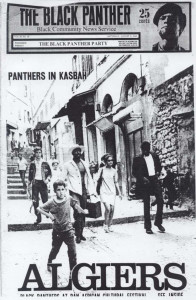The Black Panthers: Diplomats for Revolution
 Last weekend I saw the new documentary “The Black Panthers: Vanguard of the Revolution.” I have read a lot about the Panthers since I was in high school. Much of what I know comes from the larger context of the Black Power Movement, which includes Malcolm X, Angela Davis, Stokely Carmichael and the Nation of Islam. The film is really meant to be a primer for people who don’t know much about the Panthers to get a basic understanding of their most important milestones, like the breakfast program and the murder of Fred Hampton. The two-hour movie is packed with a lot of information; so much information that many of the topics brought up could be their own documentaries.
Last weekend I saw the new documentary “The Black Panthers: Vanguard of the Revolution.” I have read a lot about the Panthers since I was in high school. Much of what I know comes from the larger context of the Black Power Movement, which includes Malcolm X, Angela Davis, Stokely Carmichael and the Nation of Islam. The film is really meant to be a primer for people who don’t know much about the Panthers to get a basic understanding of their most important milestones, like the breakfast program and the murder of Fred Hampton. The two-hour movie is packed with a lot of information; so much information that many of the topics brought up could be their own documentaries.
Following the film screening, director Stanley Nelson was present and took questions from the audience. The most common questions were why was this or that not included in the film. The reality here is that it was meant to be a two-hour movie, and only so much time to cover all the important topics. A true movie that included every aspect of the Black Panther timeline would be a 10-hour mini-series!
Some of the topics that were briefly discussed in the film that I would have liked to have learned more about include the misogyny within the Party, the alleged crimes committed by Ericka Huggins, Jamal Joseph and others, and the weird, criminal behavior of Huey Newton and Eldridge Cleaver. But, again, maybe these subjects need their own dedicated movies.
What stood out to me was the international solidarity the Panthers attempted to create after Cleaver went into exile in Algeria via Cuba, following a police ambush in Oakland that killed young panther Bobby Hutton in 1968. By this time, the Panthers had already gained a reputation as revolutionaries by other oppressed groups worldwide and connected with other liberation struggles.
Algeria was already a hotbed of revolutionary acts, since its violent independence from France in 1962. (To learn more about the Algerian struggle, read Frantz Fanon’s A Dying Colonialism and watch Gillo Pontecorvo’s powerful The Battle of Algiers. – both well worth your time!) By the time Cleaver and company came to Algeria in 1972, President Houari Boumediene had turned his country into a haven for other revolutionaries seeing refuge. The Panthers were granted an office space in the old North Vietnamese embassy, a small, monthly stipend from the Algerian government and were allowed to grant asylum to other Panthers coming from America. Kathleen Cleaver once said that the BPP international chapter was the “embassy of the American Revolution, receiving revolutionary visitors from all over the world,” and sharing news about “revolutionary developments within the United States.”
However, the Cleavers overstayed their welcome and were eventually kicked out of Algeria, after the fiasco behind the hijacking of Western Airlines Flight 701.
By the time the Cleavers left, Pete O’Neal, former chairman of the Kansas City BPP chapter, found refuge in Algeria and became the new leader of the international section. O’Neal was a hardcore Marxist who felt that his prosecution by the US government on gun charges was politically motivated.
Eventually O’Neal and his wife Charlotte were also forced out of Algeria and moved to Tanzania, which was ruled at the time by socialist President Julius Nyerere. O’Neal still lives in Tanzania on his farm where he advocates for community development and self-reliance. PBS also produced this documentary about O’Neal a few years ago, which I highly recommend.